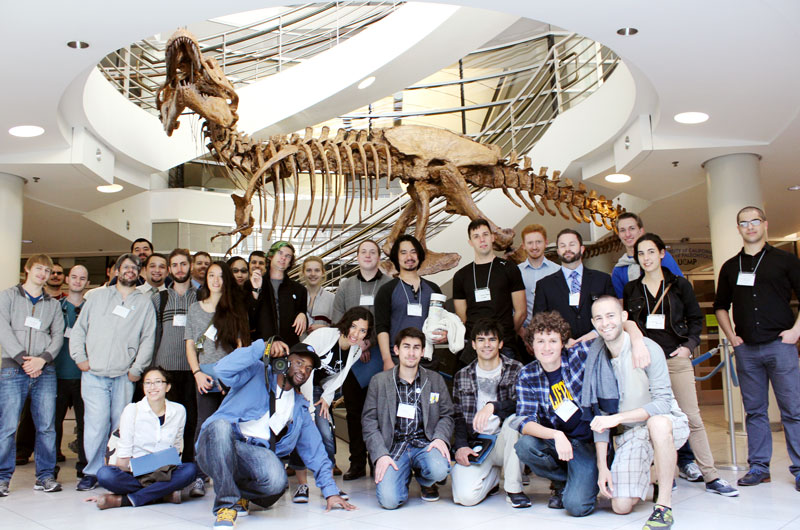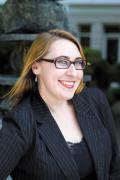So You Want to Host a Zone Meeting?
Fall
2015
In The Zone - Regional SPS Highlights
So You Want to Host a Zone Meeting?
Tips on planning, organizing, and executing a successful regional SPS gathering
By:Courtney Lemon, Programs Specialist at the Society of Physics Students, 2010–12 Associate Zone Councilor for SPS Zone 18, and Co-Chair of the 2011 SPS Zone 18 Meeting

Has your chapter decided it’s time to take the next step? Do you want to interact and network with other students from your area? Do you want to have an AWESOME, fun-filled weekend with your physics peers? Then it’s time for your chapter to host an SPS zone meeting!
Chapters in each of the 18 regional zones of SPS gather to network, socialize, present research, hear cutting-edge science talks, and share experiences at least once each year. Through lab tours, research presentations, keynotes, and trivia, SPS members build their networks and make connections to other students in their region. Each zone meeting is made possible by an active SPS chapter that decides to step up and host a meeting on its campus.
How do you get the ball rolling on an excellent zone meeting?
One of the best ways to see if your chapter is ready to host a zone meeting is to attend one. You want to make your meeting unique, but seeing what activities work at another zone meeting can be a great starting point. Visit the SPS website to see what zone meetings are coming up near you. Most zone meeting hosts also submit reports about their experience that are posted on the SPS website. These are great resources for future hosts.
Before you commit to hosting a zone meeting, make sure that your department and institution will support your chapter’s endeavors. You may need to use classrooms or other spaces in your physics building, and having your department’s support is invaluable in making room reservations, unlocking doors, etc. Your department may also be willing to help offset the cost to participants with some financial support.
The next step is to contact your associate zone councilor (AZC) and zone councilor (ZC). These are members of the SPS National Council that you and your fellow chapters have elected to represent your region. It’s important to discuss hosting a zone meeting with them because they will know whether other zone meetings are planned for your region, and they will be able to offer support, ideas, and information about the resources available to zone meeting hosts.
Your AZC and ZC can connect you with active chapters in your area, and it’s a good idea to involve them in the planning process. Consider asking a few students from other chapters to join a “planning committee.” If they do, you’ll know that there’s interest as well as engagement, and a serious commitment to attend. They will likely contribute valuable ideas and be able to expand your program options.
When you are looking to set a date, check the school calendars around your area and consult with members of your planning committee from other institutions. Try to plan around midterms, finals, breaks, federal holidays, and the physics GRE. Physics students are likely to have previous obligations on those dates. You can also look around for an American Association of Physics Teachers (AAPT) or American Physical Society (APS) section meeting to team up with, allowing students to attend two meetings for the price of one!
Once you’ve got a date set, reach out to the SPS National Office along with your ZC and AZC for marketing help. They can help you distribute information to all of the schools in your region. They can also help you find your zone’s Facebook page and other social media resources. Also, contact the SPS National Office at sps [at] aip.org so that your meeting is added to the SPS calendar. The SPS National Office also sends recruitment packages full of SPS goodies to zone meeting hosts, as well as up to $500 to help fund zone meetings! In addition, the SPS National Office can provide registration services, connections to potential speakers, an SPS National representative at your meeting, and maybe even some travel support for attendees.
So, what ACTUALLY happens at a zone meeting?
Well, this part is up to you! Zone meetings can showcase the host school’s labs through tours, and its outstanding faculty through keynote talks. They can incorporate demonstration shows, social activities, and physics competitions. They traditionally offer students the opportunity to present their research and outreach activities in talks or at a poster session. Many zone meetings also include talks by physicists working at national labs or in industry positions in the region.
Many zone meetings begin on Friday evening and continue into Saturday evening, ending with enough time for students to do homework or drive back to their home universities, while others last through Sunday morning. Kick-off the meeting with a public lecture, science café, a physics party (think trivia, competitions, and liquid-nitrogen ice cream!), or even a Friday night keynote.
Events on Saturday often include student talks and posters, keynote talks, networking opportunities, lab tours, career workshops or panels, and a banquet. If transportation is easy, you might consider going to a local planetarium or facility for a tour, or even doing outreach at a local street festival. Schedule time to take a group picture to send to SPS National!
Make sure that you take lots of pictures and document the meeting! Create a hashtag that people can use on Twitter, Instagram, and Facebook to track participation. Contact your local newspaper or your school's newspaper, and invite reporters to come to the keynote and share what your chapter has accomplished. If your university has a photojournalism club, invite members to help capture the event as well. Collect comments from attendees at the end of the meeting. Write a story for The SPS Observer about your meeting!
As other chapters that have done it will attest, hosting a zone meeting is one of the best ways to engage your chapter and take it to the next level. Meeting other students in your area will really help you connect to the larger physics community. //
2015-2016 SPS Zone Meetings
Spring 2016
Zone 10 - University of Central Arkansas
March 4-5
Zone 11 - South Dakota School of Mines
March 11-13
Zone 6 - Embry-Riddle Aeronautical University (FL)
March 18-20
More dates to be announced
Go to www.spsnational.org/meetings/zone-meetings for the latest updates.

